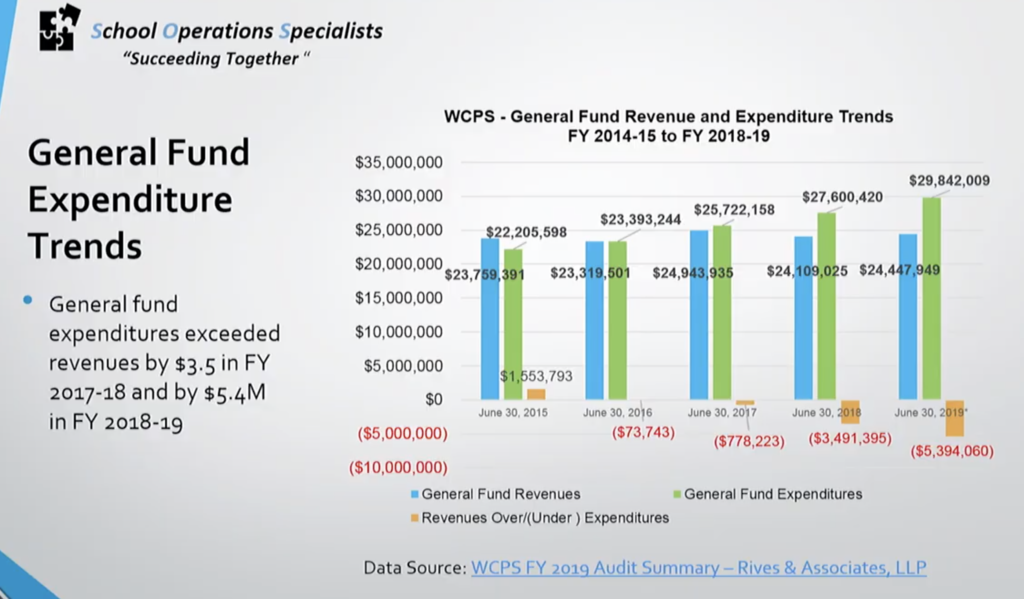
Consultant: WCPS overspent on teachers, contract services and supplements for years as fund balance declined
Here are some of the highlights from School Operations Specialists president Aaron Beaulieu’s presentation to the Board of Education Monday evening. Our complete report follows:
• The district has a $1,812,630.53 positive balance in its accounts for now, due in part to expense savings from the last quarter as a result of COVID-19, the use of COVID-19 state and federal funds to cover some expenses and maximizing the use of state funding. However, the district still must repay a $3 million loan from the School Food Services Fund from 2018-19 school year, as well as a $2,166,962 loan from the state low-wealth supplemental fund, which was used to meet June 2020 payroll and to pay teachers’ supplements.
• WCPS has a significant trend of overspending and its financial procedures and budgeting efforts were not in compliance with statutory regulations. This also means that the district was not operating with a balanced budget.
• School Operations Specialists (as well as Rives & Associates, the district’s former auditor) noted that the decline in the fund balance, which went from a positive $7 million in 2015 to a negative $2.4 million in 2019-20, was most pronounced in the 2017-18 school year, but had been steadily dropping since 2016.
• SOS pointed to increases in teachers’ supplements as one of the reasons for the deficit and recommended changing those supplements to a flat rate rather than a percentage of teachers’ salaries, which would save money. The consultants also pointed paying for positions not funded by the state with local funds as a key factor in WCPS’ overspending.
• The county’s local spending on education was also highlighted, suggesting that Wayne County’s spending on education is well below average.
• SOS pointed to significant lack of fiscal oversight by school personnel, suggesting that the district’s key administrators should have made the district’s position clear to the board, and suggested remedies to balance the district’s revenues vs. expenditures. Note: In an interview Tuesday, Beaulieu said that a review of Board of Education meeting minutes indicated that the district’s former finance officer alerted board members about the deficit last July.
• Moving forward, the consultant suggested that the district be much more transparent with its financial dealings and budgeting, including with the county, and should make much more information available to residents.
School Operations Specialists presented its findings at the Wayne County Board of Education’s regular meeting Monday night, citing several expenditures as contributing factors to the district’s projected $5 million-plus deficit.
However, president Aaron Beaulieu said many of the problems he and his subcontractors discovered with the district’s finances were the result of overspending and a lack of communication between school personnel and the board.
Beaulieu also advised that certain categories, like teachers’ supplements, benefit costs, significant increases in salaries and contract services, also were a factor in the budget troubles.
He did not address high-level Central Office salaries, which were identified as an area of concern in the district’s latest audit.
•
The consulting firm was hired to review the district’s financial status and procedures after the discovery of the multi-million-dollar shortfall earlier this summer.
“There has been a lack of fiscal oversight in the district,” Beaulieu told board members Monday.
The concerns included not following statutory requirements — passing a balanced budget resolution, for example — and not having complete, accurate and in-balance budget documents.
Beauileu said that the resignation of Finance Officer Michael Hayes May 26 and the subsequent departure of Superintendent Dr. Michael Dunsmore June 3 left the district’s finances in even more disarray.
School Operations Specialists had to finish out the fiscal year blind — without knowing the state of the budget documents or what bills or expenditures to expect.
So, SOS advised postponing the year closeout to make sure all expenditures were accounted for and so the board and interim Superintendent Dr. James Merrill would have a clear picture of the district’s real financial status.
Beaulieu said that the district’s spending habits exceed revenue; and that there were inadequate controls, procedures and processes, as well as a lack of transparency regarding the district finances.
“If you follow the trail of the money, you can see where your resources have gone,” he said.
Beaulieu and his firm, which was established in February 2020, signed a contract to work with the district at the same time Merrill was hired.
School Operations Specialists also uses, in addition to Beaulieu, “former and current administrators” to advise its clients.
One of those administrators is helping the district unravel the financial mess.
“We have asked for some help from one of the best budget experts in the state,” Beaulieu said.
Beaulieu said previously that one of the former administrators he also would be using on a limited basis was Ricky Lopes.
Beaulieu said he used Lopes on a very limited basis because of his familiarity with WCPS’ budget.
Lopes and School Efficiency Consultants are also connected to the district’s former auditor, and the firm that presented the audit findings in early June, Rives & Associates.
Beaulieu said he was not connected to School Efficiency Consultants, but that he worked with them a couple of times as a subcontractor.
He added that he did not submit a bid for or solicit the job with WCPS, but that he was asked to do the work. He did not elaborate on who asked him or who discussed the position with him.
The district also has not discussed how Beaulieu was hired or who recommended his company that had been in existence for only a few months when WCPS discovered its budget crisis.
In fact, according to the N.C. Press Association’s lead counsel, the board likely violated state Open Meetings Law by discussing the consulting contract behind closed doors.
Beaulieu said his years of experience and exemplary work with Durham Public Schools and other districts give him the skills necessary to assist a district in financial crisis.
He said he enjoys the puzzle of working with school budgets and negotiating state, federal and local funding pots as well as navigating Department of Public Instruction school finance rules.
“I want to help,” he said.
Beaulieu said the district hired School Operations Specialists from June 4 to July 15 to close out the month and to work on budget issues, but also to oversee more than $6 million in federal and $2,517,759 in state COVID-19 funding that the district has received as of June 25.
He added that he and those working with him have found as many applications and uses for the COVID-19 funds as possible, making sure the district maximizes their use.
“We have taken a very aggressive approach,” he said. “We would rather spend the funds (than risk losing them).”
Beaulieu said that ever-changing instructions from the state and federal government on how the funds can be used will continue as both entities try to figure out how to manage — and fund — the needs for the next school year.
He added that SOS will be back later in July to assist with the budget amendment, which Merrill expects to present to the board in August.
Beaulieu said his company has no further agreements to do work for the district, but added he would be happy to assist further should his skills be needed.
•
Beaulieu said there were significant deficiencies in the district’s documents and questions about its processes and communication.
He said the deficits did not just pop up, but were evident in audit and budget documents presented to the board in previous years.
However, he said it was a matter of how those findings were presented.
“There was trend data that should have been pointed out,” he said.
Beaulieu noted, however, in an interview Tuesday, that a review of Board of Education meeting minutes indicated that the district’s former finance officer alerted board members about the deficit last July.
The SOS president mentioned multiple factors that contributed to the district budget shortfalls including decreasing enrollment, increased charter school enrollment, expensive programming and operation of individual schools, fixed cost increases that were not budgeted, lack of position control and inefficiencies within the organization.
But one of the other factors he discussed was the level of local funding — the money provided by the county to supplement the state and federal funds.
“Your local funding level is a challenge in this district,” he said.
He said Wayne County has 90 to 100 teaching positions that are not covered by the state allotment for teachers based on the district’s average daily membership (ADM) or enrollment.
The money was not in the district’s budget to pay for those expenditures.
“You have added positions to your budget that weren’t funded,” he said.
Beaulieu said in low-wealth and low local funding districts, efficiency is critical. Missed opportunities or lapses in financial or “position accounting” (knowing the number of people you have hired, how they are funded and what the actual cost for those positions is) can have serious consequences on the bottom line.
He added that benefits such as health insurance and retirement matching are often not factored into decisions to increase positions, or to budget for a statewide teachers’ step increase.
If those increases are not factored into the budget, the district is already overspending — even if the salaries themselves are accounted for in the district budget, he said.
Merrill also mentioned the need to consider all costs when adding positions in a previous board meeting.
•
Beaulieu said according to the documents he and his subcontractor have reviewed, the decline in the district’s fund balance began in 2016-17 when the local fund balance dropped by $900,000, with a $2.76 million drop following in 2017-18 and a $5.33 million drop in 2018-19, which led to the budget problems the district was confronted with this year.
“You started this decline four years ago,” he said.
Also a factor in the deficit was the refinancing of a $6.9 million “energy contract,” which the district did to get a better rate.
Beaulieu said that was acceptable, but he did scrutinize the contract and noted that the district should consult with experts to ensure the agreement was beneficial.
Beaulieu said there were a number of factors contributing to the issues in addition to the deficit spending, including increased benefit costs, cuts in state funding, low local funding levels and funds that are diverting to charter schools.
The district’s maneuvering with low-wealth and at-risk student funding has allowed it to fund some of the programming and other costs.
“Low-wealth is what is keeping your district afloat right now,” he said.
He added that the decision to borrow from the state to make payroll this year — $2.11 million — was a wise choice based on how the state factors in local support, which can affect the low-wealth funding formula.
Beaulieu said the Department of Public Instruction is predicting that the district will see a $1.8 million increase in low-wealth funding in the new year, although it is not a guarantee.
He also emphasized that low local funding impacted the district’s financial situation.
According to the Public School Forum’s 2019 Local Finance Study, Wayne County ranked 57th in relative effort, which is measured by the percentage of local revenue spent on K-12 public education.
“Wayne County spends proportionally less local revenue on K-12 education than counties with a similar ability to pay,” he said.
•
Beaulieu also mentioned the district’s teacher supplements, which are based on a percentage of the teacher’s salary and are paid in two installments.
“You have made great strides in moving your teachers’ supplements forward,” he said. “But that is coming at a cost.”
Wayne County is ranked 32nd out of 115 districts in average teacher supplements; 56th in assistant principal supplements; and 79th in principal salary supplements.
Beaulieu also noted that average local supplements for teachers increased significantly in 2019-20.
He suggested that the board examine those supplements and recommended implementing a flat rate to save money.
Beaulieu also reviewed the district’s expenditure trend analysis:
• Local salary supplement cost outpaced local revenues beginning in 2017-18, primarily due to maintaining supplement structure as a percent of state salary schedules (significant increase in state teacher pay in 2017-18 placed additional pressure on the local budget).
• Cost of contractual services increased significantly in 2017-18 and accelerated further in 2018-19.
Beaulieu also discussed the district’s current financial picture — as of June 25.
The district, he said, has a positive revenue balance of $1,812,630.53 — a figure he attributes to significantly reduced expenses in the last quarter of 2019-20 because of the COVID-19 outbreak, as well as maximized use of state and COVID-19 funds.
However, the district still has to repay a $3 million fund transfer made in 2018-19 from the School Food Service account as well as the $2,166,962 borrowed this year from the state low-wealth supplemental fund to help the district make its June payroll and to pay teachers’ stipends.
That loan will need to be paid back with interest.
•
In its recommendations for the district moving forward, School Operations Specialists advised the district to get its financial house in order.
That includes:
• Compliance with statutory requirements around budgeting.
• Create balanced budget — all funds.
• Review expenditure trends for the last four years.
• Strengthen internal controls.
• Increased transparency around budget and expenditures.
• Quarterly reporting of expenditure data, position reconciliation and fund balance projections.
• Foundation of a Budget Advisory Committee made up of community members, business leaders, county officials and school staff — 10 to15 members.
Beaulieu also suggested that the board be much more transparent with its formulas and other financial data, suggesting that some of the formulas and other financial tools be made accessible on the district’s website.
Moving forward, Beaulieu said the district has to be careful to not only consider the needs of students and teachers, but also the constraints of the budget when discussing new programming or additional personnel.
“(You) have to be able to afford it,” he said.

A loaded discussion

Fighting for their lives

Goldsboro loses a giant

“I’m a flippin’ hurricane!”
Public Notices — Nov. 30, 2025

Belting it out

Legendary

Final Four!


